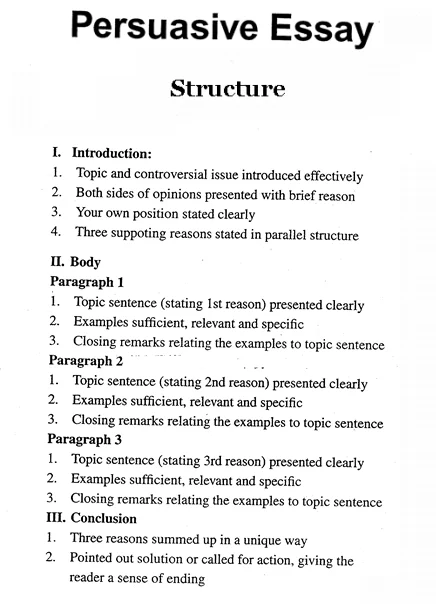- School Life
- Read Essays

Research Papers vs Persuasive Essays: Can Research be Persuasive
- by Lesley Loken
- August 27, 2024 August 27, 2024

Research papers provide objective data and analysis but frequently seek to persuade readers by making solid arguments and coming to logical conclusions.
In this sense, a research paper’s potential to persuade readers of the veracity of the facts depends on the persuasiveness of the evidence, the logic of the argument, and the clarity of the reasoning.
Can a Research Paper be Persuasive?
While research papers usually focus on examining and analyzing a specific issue, they frequently contain persuasive components. The ability of a research paper to persuade readers or change their understanding of a subject makes it persuasive.
This ability is based on the evidence and arguments that are provided.
A persuasive research paper typically seeks to persuade readers of a particular point of view or argument by using solid facts, sound logic, and compelling arguments. It backs up its claims with facts, evidence, and professional opinions.
How to Write a Persuasive Paper
1. choose a compelling topic.
Select a relevant and captivating topic. Identify an issue or argument that you are passionate about, and that has sufficient supporting evidence. A vital topic will pique the interest of your readers and make them more receptive to your persuasive efforts.
2. Conduct thorough Research

Gather credible and relevant information to support your argument.
Utilize reputable sources, such as scholarly articles, books, or reliable websites, to find evidence, statistics, and expert opinions that strengthen your position.
Remember to evaluate your sources to ensure their reliability and accuracy critically.
3. Develop a Strong Thesis Statement
Craft a clear and concise thesis statement that presents your main argument.
The thesis statement should clearly state your position and serve as a guiding principle throughout your paper. Make sure it is debatable and reflects the persuasive nature of your essay.
4. Structure your Paper Effectively
Logically organize your persuasive paper. Begin with an engaging introduction that hooks the reader and presents your thesis statement.
Follow it with body paragraphs that explain your supporting evidence and arguments coherently and persuasively.
Each paragraph should focus on a single point and include strong evidence. Conclude your paper by summarizing your main points and reinforcing your thesis statement.
Tips to use Persuasiveness in Research Papers
1. cite statistics.
Using data is the best approach that makes a research paper more persuasive. Statistics offer real, verifiable data that can back up your claims and persuade readers of them.

Make sure the statistics you use are from trustworthy and credible sources.
Additionally, use charts, graphs, or tables as appropriate to help the statistics be understood clearly.
Reiterate the statistics’ significance and relevance to your position by analyzing and interpreting them, enhancing the research paper’s persuasive power.
Explain the problem
Clarify the issue or problem you are addressing in your research paper to increase persuasiveness. Give a thorough and brief review of the subject, emphasizing its importance and applicability.
To instill in the reader a sense of urgency and importance, clearly identify the issue and its repercussions. To arouse feelings or grab attention, compelling use of language is critical.
Consider including case studies or real-world examples to further demonstrate the problem’s effects and help readers relate to it more personally.
Propose Solutions
An excellent method to increase persuasiveness in a research paper is to offer answers. After outlining the issue, provide thoughtful and doable remedies for the specific problem.
Each proposed solution’s advantages and benefits must be stated clearly, emphasizing its viability and possible impact.
Provide proof to support your claims, such as pertinent studies, professional judgments, or practical implementation examples.
Additionally, foresee any objections and answer them before they arise by demonstrating the strength and viability of your suggested solutions. This strategy highlights your persuasive skills by outlining a thorough and solid course of action.

List the Consequences of the Issue
Analyze and list any probable consequences or negative repercussions of the current issue. Explain how these effects will affect people, groups, or society.
To arouse feelings and engage readers, use powerful language and vivid examples. You can convincingly convince readers of the importance and urgency of addressing the problem and put your suggested remedies into action by highlighting the substantial and far-reaching repercussions.
Cite Case Studies
Case studies give actual instances from the real world to support and illustrate your points. Select case studies that demonstrate the desired effects or consequences for your topic.

The case studies’ specifics, such as the background, methods, and outcomes, should be explained in full.
Analyze the results, emphasizing how they corroborate your claims and underscore the need to take action.
You can bolster your argumentative appeal and persuade readers of the reliability and value of your research by using intriguing case examples.
Why a Research Paper is not suited for Persuasion
Objectivity and neutrality.
Research papers are expected to maintain high objectivity and neutrality. Their primary focus is on presenting evidence-based findings and analysis, rather than advocating for a specific viewpoint.
Persuasive content, on the other hand, tends to be more subjective and biased, aiming to sway readers towards a particular opinion or stance.
Rigorous methodology
Research papers follow a thorough method that involves gathering data, conducting experiments, or performing analyses. This approach prioritizes the scientific process and the integrity of the research.
While persuasive content may rely on anecdotal or emotional appeals, research papers emphasize empirical evidence and logical reasoning.
Scholarly audience
Research papers are typically written for a scholarly audience, such as academics or researchers in a specific field. These readers expect a comprehensive examination of the topic supported by evidence and scholarly references.
Persuasive content often employs rhetorical techniques and appeals to a broader audience, which may not align with the expectations of a scholarly audience.
Balance and complexity
Research papers often explore complex topics that require a nuanced and balanced approach. They present different perspectives and consider multiple variables, aiming to contribute to the existing body of knowledge.
Persuasive content tends to simplify complex issues to appeal to emotions or personal beliefs, which can overlook the intricacies and potential counterarguments associated with the topic.
Differences between a Research Paper and a Persuasive essay
A research paper’s main objective is to study and analyze a particular topic or problem using credible sources of information.
It aims to advance the state of the art in the field. A persuasive essay, on the other hand, tries to persuade the reader to adopt or endorse a particular position or argument. Its objective is to impact the reader’s opinions or behavior.
Structure and Format
The normal structure of a research paper is an introduction, literature review, methods, results, and discussion. They frequently call for formal language, citations, and references.

The length of a research paper is dependent on different factors such as the subject or academic level.
Contrarily, persuasive essays normally adhere to a more flexible framework, with an introduction, body paragraphs that provide supporting evidence, and a conclusion.
Rhetorical devices, passionate appeals, and a more conversational tone may be used in persuasive writing.
Evidence and Analysis
Research articles heavily rely on scholarly sources, empirical data, and logical analysis. They necessitate in-depth investigation, data gathering, and conclusion interpretation.
In contrast, personal experiences, fiery arguments, and subjective reasoning may be used in persuasive writing.
While persuasive essays should include some supporting data, the focus is frequently more on persuasive speech than in-depth research.
Target Audience
Typically, research papers are meant for an intellectual or scholarly audience, such as professors, researchers, or other students studying the same subject. They presuppose a certain amount of expertise and competence in the matter.
On the other hand, persuasive essays may try to appeal to readers with various backgrounds and degrees of experience to reach a wider audience.

IMAGES
VIDEO